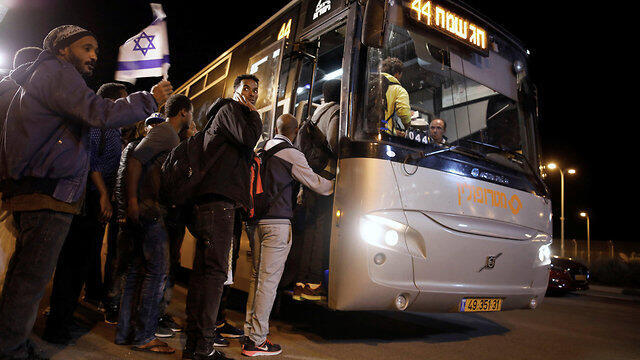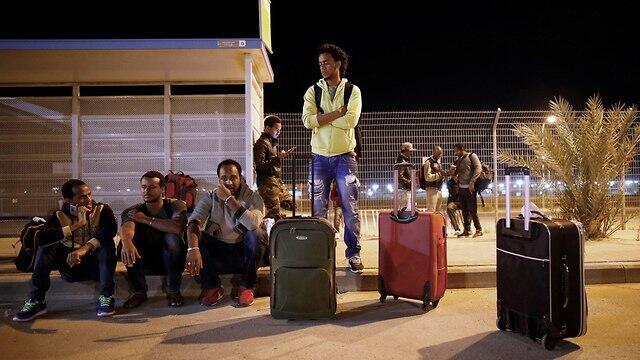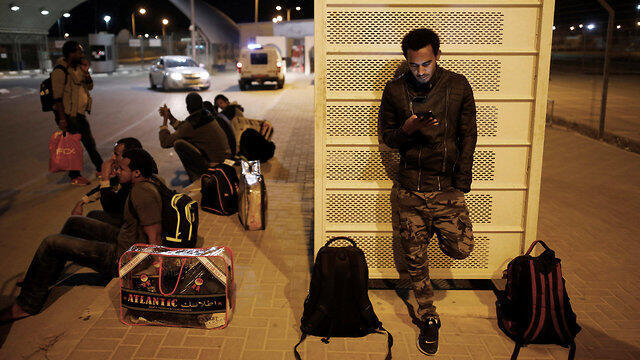Getting your Trinity Audio player ready...
A group of 58 African migrants released from detention on Wednesday who had been awaiting deportation before the collapse of an international deal to send them to Rwanda, have said that they intend to return straight to Tel Aviv and search for work there, despite being instructed by authorities not to.
“I am going to Tel Aviv where I will look for work,” Mahawu Kata told Ynet outside the detention facility, who appeared nonchalant about the prospect of being detained one again if he violated his terms.
Migrants board bus to Tel Aviv
(צילום: רועי עידן)
They were forbidden from living or working in seven cities in which the migrant population is most heavily concentrated, Tel Aviv among them.
His friend, Musia Bara from Eritrea, added that he was not told a thing and that he did not know what he was going to do after arriving in the coastal city.
In addition to Tel Aviv, the migrants, who Israel says are in the country for economic reasons rather than as asylum seekers, are forbidden from living or working in Bnei Brak, Petah Tikva, Jerusalem, Eilat, Netanya or Ashdod.
In south Tel Aviv, the area most heavily populated with the illegal migrants, residents were unsurprised by their stated intention to ignore the authorities’ orders.
“The people who were released earlier also returned here,” said Sheffi Paz who leads the pro-deportation movement "South Tel Aviv Liberation Front."
“It just proves what I have said the whole time. These are people who violating the law. There is no enforcement and the tension and anger will only increase,” she warned. “There are no inspectors to find them and no one cares where they are. At the end of the week we will look for them, call the police and see what happens.”
Paz, who met with Prime Minister Benjamin Netanyahu earlier this week to propose various contingency plans to deal with the migrants, asked angrily why they don’t head to the refuge cities prepared for them.
“Were enclosures not made for them? Are there not lists of thousands of people on kibbutzim and moshavim who are prepared to host them? Suddenly, when there is no deportation tomorrow, they don’t need to host them?,” she asked.
Some 200 additional migrants are still being held at the Saharonim detention centre in southern Israel awaiting possible deportation to Uganda but their fate depends on whether an Israeli envoy who visited the east African state on Wednesday had managed to secure a deal for them to be taken in.
In the event agreement is not reached, they too will be freed, probably on Thursday. The long-term fate of the freed migrants was unclear but Netanyahu said he was seeking a new relocation deal, although he gave no details.
Netanyahu said on Tuesday he was cancelling an agreement with the UN refugee agency to relocate thousands of African migrants, bowing to right-wing pressure at home to scrap the deal.
Netanyahu's critics seized on his backtracking on the arrangement—under which thousands of other migrants would have won the right to remain in Israel—as a sign of political weakness.
For the estimated 37,000 migrants in Israel, most of them from Eritrea and Sudan, the whirlwind of announcements over the past three days about their future has swept their status even deeper into limbo.
On Monday, Netanyahu announced the arrangement with the UNHCR that would have relocated about 16,250 migrants to Western countries.
But the fact that thousands more would be allowed to stay raised an outcry from right-wing politicians and on social media from Netanyahu's nationalist voter base, which wants the migrants expelled. He then announced he was putting the agreement's implementation on hold and by Tuesday, he nixed it altogether.
The 58 migrants released from Saharonim in the south of the country boarded buses to Tel Aviv. They were freed because the state could not give assurances to the Supreme Court that it had found a safe haven for them abroad.
Several hundred migrants held a demonstration in central Jerusalem later on Wednesday demanding to be allowed to stay and for the forced deportations to be stopped.







